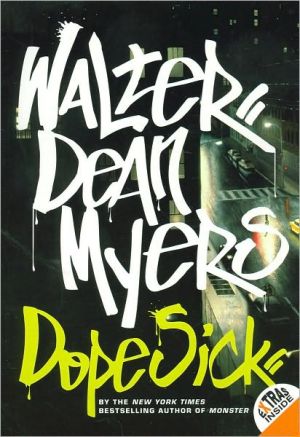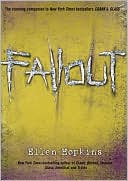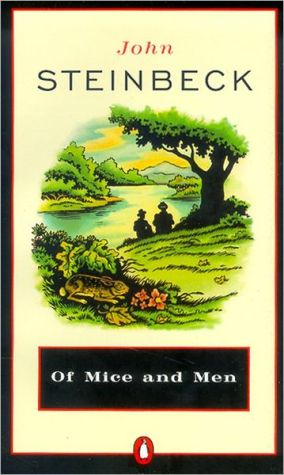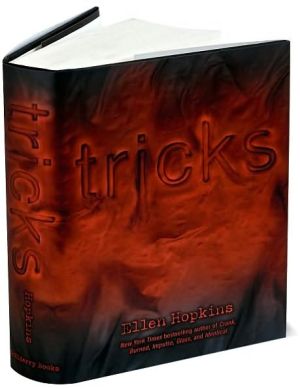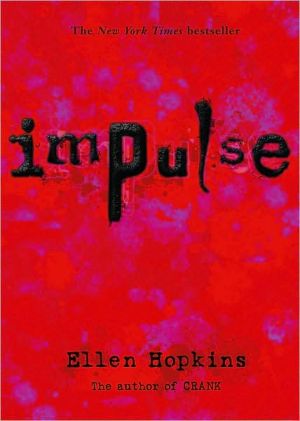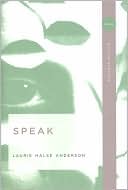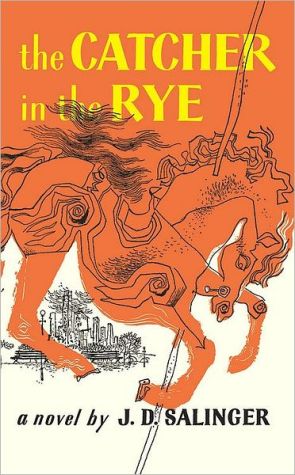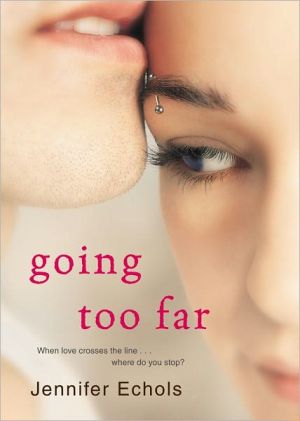Dope Sick
"You can create something new and change the direction of your life." —Walter Dean Myers on DOPE SICK\ A drug deal goes south and a cop has been shot. Lil J's on the run. And he's starting to get dope sick. He'd do anything to change the last twenty-four hours, and when he stumbles into an abandoned building, it actually might be possible...\ Elements of magical realism intensify this harrowing story about drug use, violence, perceptions of reality, and second chances.\ "Drugs, drive-by...
Search in google:
"You can create something new and change the direction of your life." Walter Dean Myers on DOPE SICK A drug deal goes south and a cop has been shot. Lil J's on the run. And he's starting to get dope sick. He'd do anything to change the last twenty-four hours, and when he stumbles into an abandoned building, it actually might be possible... Elements of magical realism intensify this harrowing story about drug use, violence, perceptions of reality, and second chances. "Drugs, drive-by shootings, gang warfare, wasted lives Myers has written about all these subjects with nuanced understanding and a hard-won, qualified sense of hope." The New York TimesPublishers WeeklyUsing both harsh realism and a dose of the fantastic, Myers (Game ) introduces an inner-city teen in the jaws of a crisis: 17-year-old Lil J is holed up in an abandoned building, believed to have shot an undercover cop in a drug bust, while police officers assemble in the street below. As he searches for a way out, Lil J is stopped by Kelly, an eerily calm vagrant who invites him to "cop a squat and check yourself out on the tube." Kelly's TV not only plays scenes from Lil J's life but projects what will happen if he sticks with his current plan: suicide. Shocked, Lil J considers Kelly's question, "If you could take back one thing you did... what would it be?" Aided by Kelly's TV, Lil J revisits pivotal moments and wrestles with his fate. As expected, Myers uses street-style lingo to cover Lil J's sorry history of drug use, jail time, irresponsible fatherhood and his own childhood grief. A didn't-see-that-coming ending wraps up the story on a note of well-earned hope and will leave readers with plenty to think about. Ages 14-up. (Feb.) Copyright © Reed Business Information, a division of Reed Elsevier Inc. All rights reserved.
Dope Sick AER\ Chapter One\ My arm was hurting bad. Real bad. The bone could have been broken. I couldn't tell. I just knew it was hurting and swollen. I felt like just taking the gun out and throwing it away and giving up so I could get the mess over with. I opened my mouth so I wouldn't make so much noise when I breathed. Down the street I saw the patrol car was still at the corner. He had his lights flashing. I didn't know if he'd seen which way I was running or not. I knew I was too tired to keep running much more.\ I started to lift my arm to look at my watch and the whole arm just lit up with pain. The bone had to be broken. I figured it was two or three o'clock in the morning. Skeeter had called me just past midnight and told me they got Rico. I knew Rico was going to punk out. In a way I was glad they got him, but I knew he was going to blame everything on me.\ I was in the shadows in a shop doorway and I knew I couldn't stay there much longer. I had to lie down or sit down or something. Had to get my head together. There was an old building across the street, and it looked like the front door was open. Maybe some juiceheads was in there. I didn't know, but I couldn't stay on the street much more. My arm was hurting too bad, and if that cop had really seen it was me, there would be more cops coming soon.\ I felt like crying, like just running down the street and letting them shoot me...anything and everything at the same time. I was messed up big-time and I knew it.\ I saw two women walk over to the police car. Probably hookers out doing their stroll. The cop in the car was talking to them and then he got out and went around the backof the car. I looked to see if he had his gun in his hand. From where I was in the doorway I couldn't see too clear. He might have. I could feel my heart beating fast and my right hand was shaking in my pocket. The cop and the two women walked a little way down the street, and he was up on his toes, trying to look into one of the building windows. I took a deep breath and moved from the doorway to behind a parked car. The street wasn't big and half the buildings didn't have nobody living in them, so it was dark except for the streetlight, and that wasn't working right. Nothing wasn't working right in my life.\ I got across the street and into the doorway of the building I had been scoping. Looking down the street, I saw the cop and the two women were still together. The sound of another siren scared me. I couldn't tell where it was coming from. Keeping my eyes on the cop down the street, I pushed on the door behind me with my foot. It opened and I eased into the house.\ The smell was terrible. Like somebody had been using it as a piss hole. It was dark except for the light from the cracked-open door. I saw some steps and started thinking about the roof. If I got to the roof, I could come down in another building, maybe even on another block. My left arm was pretty stiff and I didn't want to move it too much. I let go of the Nine I had been carrying since I left my house and fished around in my pockets for some matches. When I found some, I was scared to light them. Maybe the cop had seen me come into the building. Maybe he was just waiting outside for some backup before he came busting in the door.\ I put the matches in the pocket with the Nine and started up the steps, walking close to the wall so they wouldn't creak too much.\ The smell wasn't no better, but it changed a little as I got near the second floor. It was just that musty smell that old buildings have sometimes. I smelled some vinegar too, so I thought there might have been some dopeheads shooting up in one of the rooms.\ I stopped and lit a match, holding the book in my left hand and striking the match with my right. There was garbage on the floor and some piles of old plaster. I seen where the next steps was and started for them. I was being quiet because I didn't want to run into no dopehead or crazy homeless dude.\ When I got to the third floor, I heard a sound. It was people talking. I held my breath, trying to figure out if it was somebody who had come in after me or somebody already in the building. My heart was pumping big-time, a mile a minute, and I was feeling sick to my stomach as I leaned against the wall.\ Maybe there was a way to figure out where the sound was coming from, but I didn't have that way in me. I was too scared to think good. I knew that if the sound was in the building, it wasn't no cops, so I started up the stairs again. Halfway up the next flight I saw a light coming from under one of the doors. Then I heard the sound again and knew somebody had a television on.\ If it was a homeless guy, it would be okay, unless he was crazy and had a knife or an axe or something. If I had to shoot him, the cops might hear it. If it was a doper it would be better. A doper might just be on a nod and might not even wake up.\ Dope Sick AER. Copyright © by Walter Myers. Reprinted by permission of HarperCollins Publishers, Inc. All rights reserved. Available now wherever books are sold.
\ The Bulletin for the Center for Children's Books“Readers might be moved to consider what they’d do in their own lives if they could start with a clean slate.”\ \ \ \ \ \ Publishers WeeklyUsing both harsh realism and a dose of the fantastic, Myers (Game ) introduces an inner-city teen in the jaws of a crisis: 17-year-old Lil J is holed up in an abandoned building, believed to have shot an undercover cop in a drug bust, while police officers assemble in the street below. As he searches for a way out, Lil J is stopped by Kelly, an eerily calm vagrant who invites him to "cop a squat and check yourself out on the tube." Kelly's TV not only plays scenes from Lil J's life but projects what will happen if he sticks with his current plan: suicide. Shocked, Lil J considers Kelly's question, "If you could take back one thing you did... what would it be?" Aided by Kelly's TV, Lil J revisits pivotal moments and wrestles with his fate. As expected, Myers uses street-style lingo to cover Lil J's sorry history of drug use, jail time, irresponsible fatherhood and his own childhood grief. A didn't-see-that-coming ending wraps up the story on a note of well-earned hope and will leave readers with plenty to think about. Ages 14-up. (Feb.)\ Copyright © Reed Business Information, a division of Reed Elsevier Inc. All rights reserved.\ \ \ Children's Literature\ - Anita Barnes Lowen\ Jeremy Dance (better known on the street as Lil Jay) has a life that has just gone from bad to worse. The drug deal that was going to make him some money has gone terribly wrong. A policeman is shot—maybe dying—and Rico (the guy who put the deal together) has been picked up. Rico told the cops that Lil Jay's the one who popped the cop. He has messed up big time and he knows it. In a seemingly abandoned building, Lil Jay finds Kelly, a spooky dude who can switch his television channels through Lil Jay's past, present, and, perhaps, his future. Is Kelly real, the product of a drug fueled hallucination, or a supernatural being? Could it be possible that Lil Jay is near death and his mind is skittering through all the good times and the bad? Is there any possibility of a second chance for Lil Jay to turn his life around? This excellent choice for teenage boys and at-risk teenagers is certain to lead to a lively discussion. Reviewer: Anita Barnes Lowen\ \ \ \ \ School Library JournalGr 9 Up\ Things have never looked worse for 17-year-old Jeremy Dance, known as Lil J. After getting involved in a drug deal that ended in the shooting of a police officer, he's nursing a badly wounded arm and desperately looking for a place to hide. He stumbles into an abandoned building and finds an open apartment occupied by an enigmatic man who introduces himself as Kelly. Although Lil J at first assumes that Kelly is just another junkie squatter, a common sight in his Harlem neighborhood, he slowly begins to realize that something much deeper-and much odder-is going on. Using a television remote that seems capable of revealing all facets of Lil J's life both past and present, Kelly guides, probes, and sometimes unsettles the teen into reflecting on the choices he's made leading to a life of crime and drug addiction. Myers has long been an excellent source of rich, nuanced portrayals of inner-city teens, and Dope Sick is no exception; the use of magical realism brings depth and an intriguing strangeness to his sharp-eyed observations of Harlem street life and Lil J's interactions with family and friends. Lil J is a particularly complex and sympathetic character; even as Kelly forces him to take responsibility for his poor decisions, readers come to understand how poverty and a family history of substance abuse impacted his development. Myers's gritty depiction of one young man's struggle to overcome the lure of the streets is sure to keep teens turning the pages.-Meredith Robbins, Jacqueline Kennedy Onassis High School, New York City\ \ \ \ \ \ Kirkus ReviewsStreet life on DVR. After a botched drug deal leaves a cop fighting for his life, Jeremy Dance (aka Lil J) knows that he made some bad decisions. Seeking refuge in an abandoned building, Jeremy runs into Kelly, a mysterious man who has a remote control that allows Jeremy to review his life and change one critical decision. Together they view key moments and discuss what Jeremy did or did not do to end up where he is now. Lil J's blend of street bravado and uncertainty never really comes through effectively, leaving readers with a whining narrator. The supporting characters have vivid page presence, however, in stark contrast to the main character's dull personality. The disjuncture between Jeremy's language when he is reminiscing about his untroubled home situations and his discussion of street life shows genuine character development, but it is not enough to compensate for the thin premise. An ambiguous ending coupled with the fantastical slant further diminish the message. In his most recent urban YA title since Street Love (2007), Myers delivers a solid tale, but misses the nuances. (Fiction. YA)\ \ \ \ \ ALA Booklist"Myers’ narrative strategy is so inherently dramatic that it captures his readers’ attentions and imaginations, inviting not only empathy but also thoughtful discussion."\ \ \ \ \ New York Times"Drugs, drive-by shootings, gang warfare, wasted lives—Myers has written about all these subjects with nuanced understanding and a hard-won, qualified sense of hope."\ \ \ \ \ Bulletin of the Center for Children’s Books“Readers might be moved to consider what they’d do in their own lives if they could start with a clean slate.”\ \ \ \ \ Bulletin of the Center for Children's Books"Readers might be moved to consider what they’d do in their own lives if they could start with a clean slate."\ \
